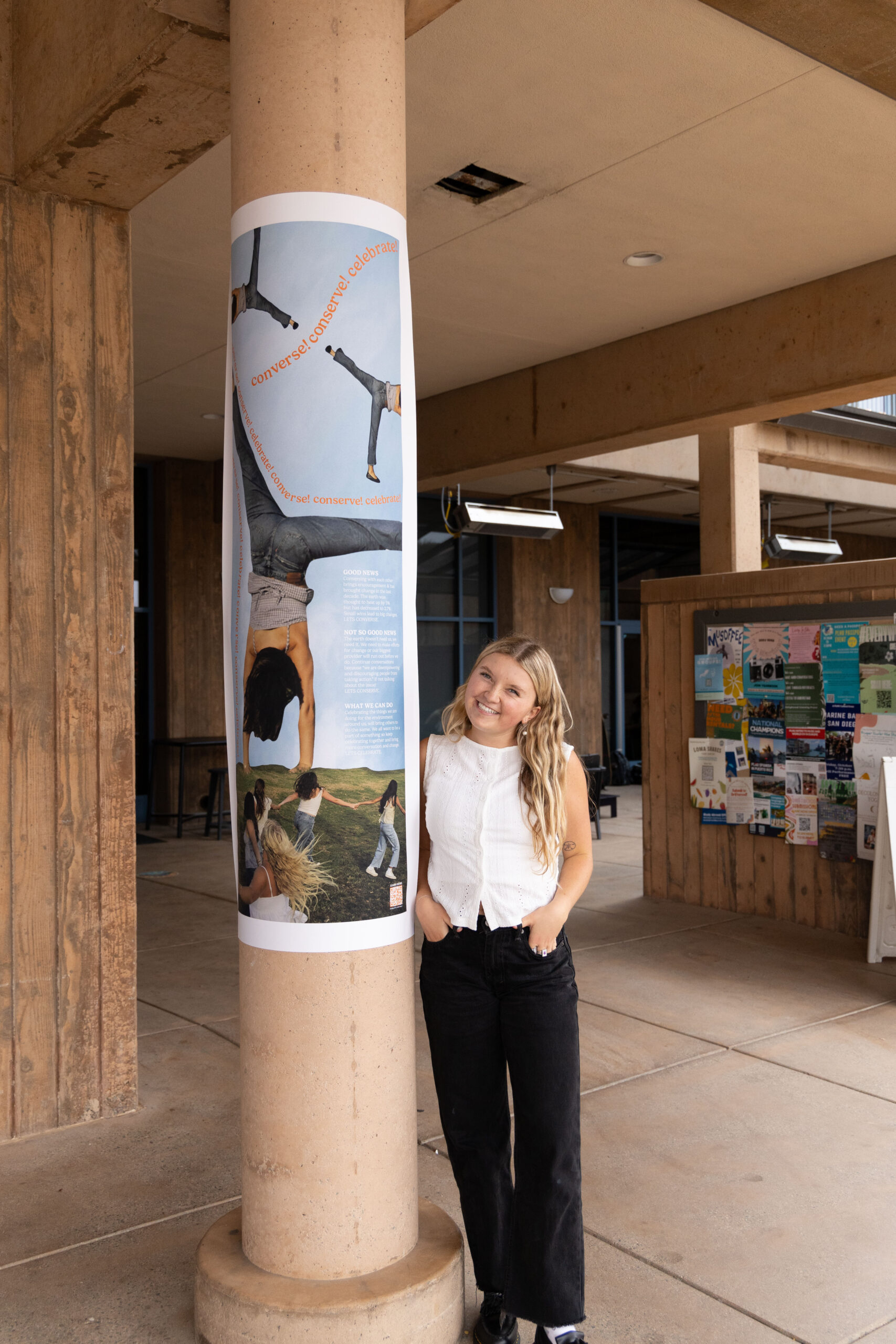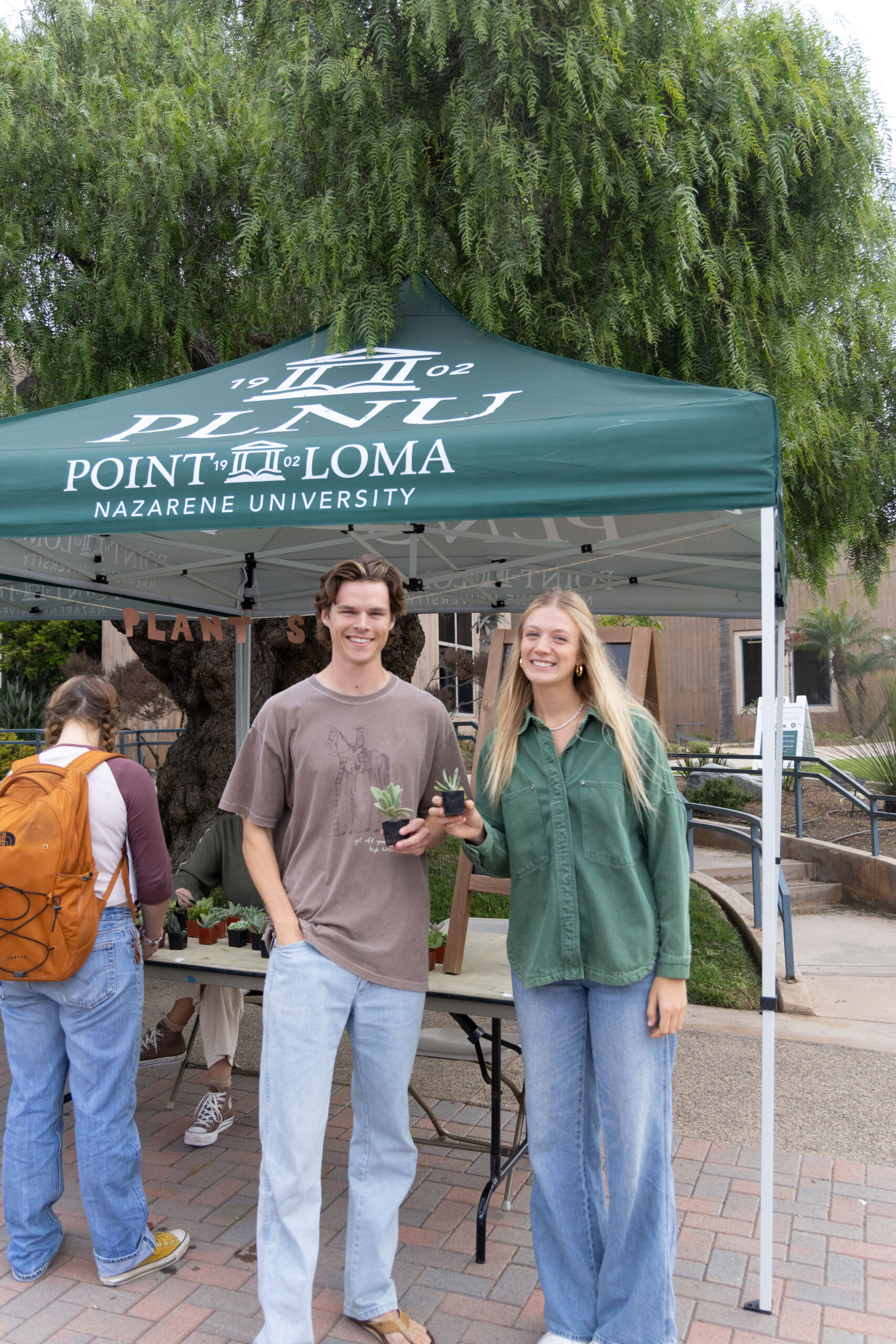Point Loma Nazarene University’s Creation Care week, an annual event hosted by the Department of Sustainability during the first week of October, featured a collaboration between graphic design students and the department.
Courtney Mayer, PLNU professor of graphic design, helped organize this project. She assigned students in her ART 4068 Graphic Design Portfolio Preparation class a project aiming to support the sustainability department’s advocacy and mission. For their assignment, students created banners, a social media post and a takeaway object related to a specific climate change issue. The banners were displayed around campus and many students handed out their takeaways after Monday’s chapel.
Climate change is an important issue for Mayer; she is presenting at the American Institute of Graphic Arts’ virtual conference from Oct. 10-12 on the intersection of graphic design and climate change advocacy.
“Because I’m Christian, I ask myself, ‘Who’s my neighbor?’” Mayer said. “And what I’ve learned is that climate change is created by the wealthiest 1 billion people, yet those who suffer are 3 billion poor and marginalized [people].”
Mayer said she hopes that her students can raise awareness about this issue through visual storytelling. For this design project, Mayer said she was inspired by Katharine Hayhoe, author of “Saving Us: A Climate Scientist’s Case for Hope and Healing in a Divided World.”
“[Hayhoe] talks about how climate conversations are hard to have because they can be really polarized,” Mayer said. “She has this way of framing a conversation where you start – it’s three steps: bond, connect and explain, and inspire hope.”
Mayer asked students to choose a topic that they care about, and create a banner that offered stories of “good news,” “not-so-good news” and action steps.

Faith Napier, a fourth-year graphic design student, referenced an article titled “Celebrating the Earth” for her research during the project.
“The good news it highlighted was about how much people are talking about climate nowadays, and how people are starting to celebrate the small wins,” Napier said. “That was reflected on my poster, because I wanted to show the positive side of what is going on. There are small changes being made, and it is impactful, so I wanted my poster to be positive, fun, bright, uplifting, [full of] movement and celebration.”
Some of the “good news” that Napier’s poster highlighted is that the earth was projected to heat up by 5% by 2025, but has only warmed by 2.7% so far.
Napier put the words “converse, conserve and celebrate” on her poster to encourage more conversations about climate change.
“We have to be making efforts for change or our biggest provider will run out before we do,” Napier said. “I handed out bookmarks as my takeaway, and there were a couple of questions to start conversations about the climate. My goal was to get people talking.”
Mayer said her goal for this project was to create engagement, not polarization.
“This was an opportunity to connect design theory and support an organization who has an objective of creating awareness and advocacy, hopefully leading to action,” Mayer said. “And it’s all embraced by our Christian values.”
Ally Gilmeister, a fourth-year environmental studies major, is the PLNU student sustainability programs coordinator who helped facilitate the collaboration between the Department of Sustainability and the Department of Art and Design.

Gilmeister chose #Everywhere for this year’s Creation Care theme.
“We decided that we wanted to go for a more interdisciplinary approach this year so that we could engage as many students as possible,” Gilmeister said. “The goal was to get as many different departments on campus, as many different student groups, involved in different opportunities.”
Besides the Department of Art and Design, Gilmeister said that she worked with the environmental studies, theology department, chapel, center for justice and reconciliation (CJR), Surfrider Foundation and New Roots Institute to develop this year’s itinerary.
Events included a panel discussion about the theology of creation care, the opportunity to network with local nonprofits that focus on food production, a film screening of “Shade Grown Coffee,” a green infrastructure forum hosted by the Surfrider Foundation, a “plant pop-up” featuring local nurseries and free eco-friendly coffee after Wednesday’s chapel.
Mayer said that she hopes Creation Care will encourage PLNU administration to continue facilitating conversations about climate change.
“I know they’re engaged, because they’ve done things like update our heating and cooling system to be more environmentally friendly, and add more chargers for electric vehicles on campus,” Mayer said. “But I want us to start asking ‘How can we do this as Christians?’ It might seem like a controversial issue, but at the end of the day, a thermometer doesn’t lie.”

